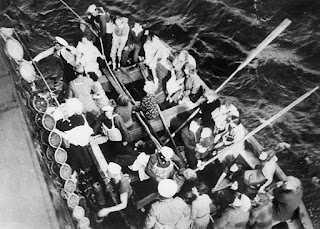Eighty years ago, Britain and France fight an imaginary war whilst the U-Boats fight a real one
The first elements
of Britain’s small expeditionary force landed in France, giving essentially
symbolic support to France which would otherwise have to bear the burden of the
war against Germany. The operation was widely mentioned on the French radio but
the British had not quite decided whether it should be treated as a secret. In the event
it was extensively reported in British newspapers, but the military authorities
for some mysterious reason took fright and draconian censorship was applied
retrospectively. The police visited newspaper offices and supervised a change
in headlines; copies of uncensored newspapers were confiscated from startled
commuters. This was one symptom of Britain’s intentional failure to prepare for
war. The Ministry of Information, which was responsible for censorship and had
an ambiguous responsibility for news management, had existed as little more
than a paper planning exercise before the war. Downing Street’s key motivation
had been to avoid doing anything that the Germans might have considered
provocative and to prevent anything developing a momentum of its own. The
result was a shambles.
The high command of
the RAF had willingly accepted the political decision not to attack inland
Germany, which was passed off as a high-minded choice to avoid civilian casualties.
In reality it was quite incapable of mounting the “strategic” offensive against
Germany industry and cities that its commanders had long held to be the force’s
true raison d’être. The RAF did attack the German naval bases at
Wilhelmshaven and Brunsbüttel, inflicting almost no damage. The bombers
suffered only slight casualties, which served to give a dangerously delusive impression
that they were capable of defending themselves.
The French army
staged a series of limited local advances into German territory, which were
given extensive publicity. This was pure propaganda. The French high command
had decided long before that it was not going to mount a serious attack on
Germany’s Westwall defences, because of a combination of sheer military
pessimism and reluctance to incur anything approaching the level of casualties that
France had suffered in the First World War. In practice Poland was left to
fight alone. The Phony War had started.
More as a
political gesture than anything else, the British government announced that it
was prepared for a war that would last three years. In part this was intended
to send a signal of resolution to Germany. It also showed that the British had
no thought of a direct military victory over Germany. Neville Chamberlain too
shied away from the human (and financial) cost of offensive warfare and nourished the fantasy
that Britain’s superior economic management would force Germany to concede when its leaders began to see the world through Chamberlain's eyes.
At sea Admiral Dönitz’s
U-Boats were giving a better lesson in how the remainder of the war was going
to be fought. The unescorted British liner Athenia was sunk by U-30 on a
purely civilian voyage. Over 100
passengers and crew died but that large majority were rescued. U-29 sent HMS Courageous
to thee bottom with 500 of her crew. Courageous was a smallish, elderly
aircraft carrier which had been tasked with hunting out U-Boats in a
consciously aggressive strategy that was utterly flawed, offering targets to
its intended victims with almost no prospect of actually finding them.



Comments
Post a Comment